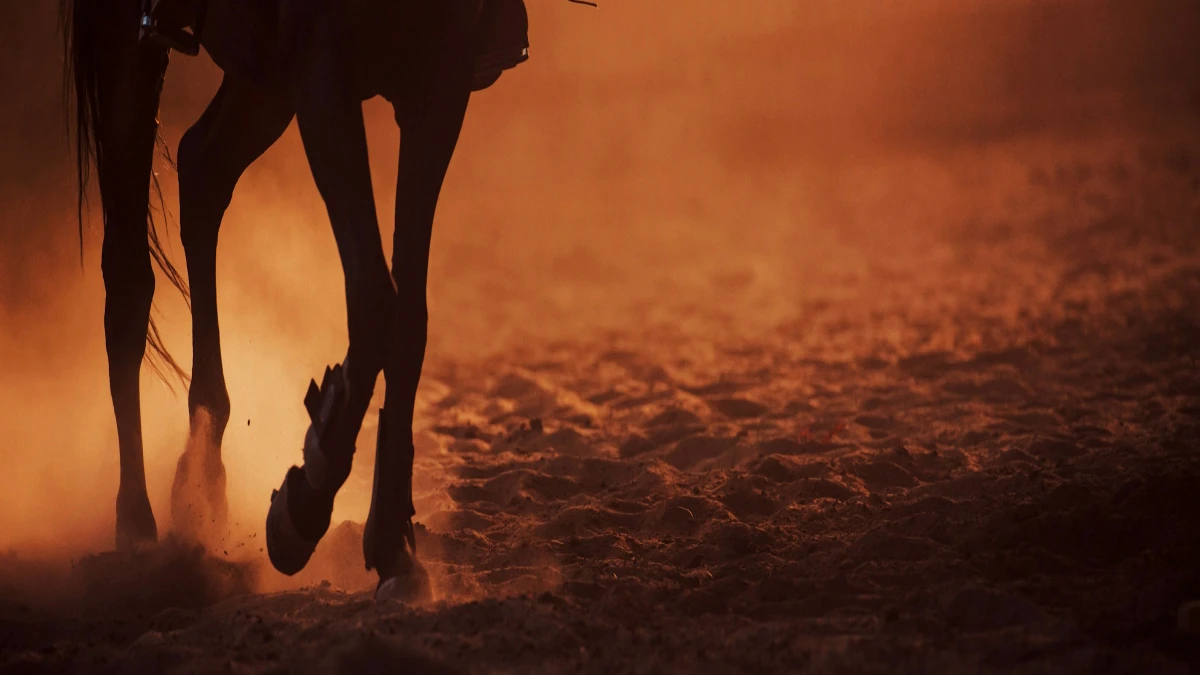The Role of Instincts in Equine Behaviour
Aug 11, 2023 by Jamie Finch

Horses, magnificent creatures that have shared a profound companionship with humans for centuries, possess a rich tapestry of behaviours deeply rooted in their instincts.
Understanding these instincts is a fascinating journey into the natural world of equines and a vital aspect of responsible horse care and effective training.
Instincts, often considered innate responses to various stimuli, have been moulded through evolution, equipping horses with the tools needed for survival, communication, and social interaction.
This exploration into the role of instincts in equine behaviour opens a window into the ancestral heritage of these remarkable animals, shedding light on how their past shapes their actions.
You uncover the intricate web of instincts that drive horse behaviour by delving into the flight response, herd dynamics, and feeding behaviours. This knowledge serves as a compass, guiding you in developing a deeper connection with your equine partners and navigating the intricate landscape of their behaviours.
In this journey, I will journey from the ancient grasslands where wild horses roamed to the modern stables where these instincts still influence the lives of domesticated horses, underscoring the timeless importance of instincts in the equestrian world.
Evolutionary Background
The story of equine instincts is intricately intertwined with their evolutionary journey.
Millennia ago, wild horses roamed vast landscapes, driven by the necessity to survive in an environment teeming with predators, changing weather patterns, and the constant search for food and water.
These ancestral horses developed a set of instincts that allowed them to navigate these challenges with remarkable adaptability.
Ancestral Environment and Origins of Instincts
In the wild, horses had to contend with threats that ranged from swift predators to sudden environmental shifts.
This led to a finely tuned flight response—an instinctual reaction to a perceived danger that often involves a rapid burst of speed to escape harm.
This fight-or-flight mechanism remains deeply ingrained in the equine psyche, dictating their responses to startling stimuli even in the safety of domestication.
Survival-Based Nature of Instincts
The survival of wild horses depended on their ability to form cohesive herds.
This need for companionship and collective defence gave rise to the herd instinct—an intrinsic drive to seek safety and social connection within a group.
This instinct endures in domesticated horses, affecting their behaviour within the barn and pasture settings and their interactions with other animals and humans.
The grazing and foraging instinct was equally vital, honed over time to ensure a reliable food supply in the wild.
Horses are natural grazers, evolved to consume small, frequent meals of fibrous plant material throughout the day.
This instinct plays a pivotal role in their dietary behaviours.
It is a crucial factor to consider in their modern care.
Key Instincts in Horses
The intricate tapestry of equine behaviour is woven from a handful of key instincts that have deep roots in their evolutionary history.
These instincts, refined over generations for survival, continue manifesting in various ways among modern-day horses.
Flight Response: Adaptation for Survival
The flight response, deeply embedded in equine DNA, is a testament to the need for quick, instinctual reactions in the face of danger.
When confronted with a potential threat, horses often opt for rapid flight, leveraging their powerful musculature to flee from harm.
Understanding the nuances of this instinct is crucial for safe handling and effective training.
Careful desensitisation techniques can help horses overcome spookiness and develop trust, enabling them to navigate potentially frightening situations with less anxiety.
Herd Instinct: Strength in Unity
Horses, once prey animals vulnerable to predators, found strength in numbers by developing the herd instinct.
In the wild, banding together provided protection, facilitated mutual grooming, and supported the care of the young.
This deeply ingrained social behaviour still shapes equine interactions today. Whether in a pasture, stable, or during training, horses draw comfort from their herd's presence— equine or human.
Recognising and respecting this instinct is vital for establishing a harmonious environment and fostering positive relationships.
Grazing and Foraging Instinct: Nature's Nutritional Strategy
The grazing and foraging instinct of horses directly reflect their evolutionary history as herbivores in grassland environments.
Equipped with an efficient digestive system to process fibrous plant matter, horses have evolved to graze for hours daily.
Replicating this natural behaviour is essential for maintaining their physical and mental well-being.
Providing access to appropriate forage and implementing feeding practices that mimic their natural behaviours can help prevent boredom, digestive problems, and behavioural challenges.
Reproductive Instincts: Navigating the Cycle of Life
Equine behaviour is further shaped by the intricate dance of reproductive instincts, a fascinating interplay between biology and behaviour that has been honed over countless generations.
Mating Behaviors: The Rhythms of Reproduction
Like many animals, horses exhibit distinct mating behaviours tightly linked to their reproductive cycle.
Factors, including day length and hormonal fluctuations, govern the equine breeding season.
During this time, stallions engage in courtship behaviours to attract mares, showcasing strength, vocalisations, and posturing displays. Understanding these behaviours provides insights into the equine reproductive cycle and helps breeders and handlers manage interactions during this season.
Maternal Instincts: Nurturing the Next Generation
The arrival of a foal triggers a complex set of maternal behaviours in mares.
From birth, mares instinctively care for and protect their young.
These behaviours include allowing the foal to nurse, grooming it, and establishing a strong bond.
This maternal care is crucial for the foal's survival, especially in the wild, where predators are constantly threatened.
In domestic settings, recognising and respecting these maternal instincts is essential for ensuring foals' well-being and proper development.
Protective Instincts: Safeguarding the Herd's Future
The protective instinct is closely tied to maternal behaviours but extends to the entire herd.
Stallions, while often perceived as dominant and aggressive, play a crucial role in protecting the group.
In the wild, a stallion will defend his herd against potential threats, using his size, strength, and vocalisations to deter predators.
This protective instinct still surfaces in domestic stallions, and understanding it helps handlers and trainers navigate interactions while ensuring safety.
Instincts in Training and Management: Bridging the Gap
Equine instincts, shaped by millennia of evolution, are pivotal in how horses respond to training and interact within their environment. Understanding these instincts allows us to create effective training methodologies and develop management strategies that align with their natural behaviours.
Harnessing the Flight Response for Training Purposes
The flight response, a survival mechanism deeply ingrained in equine behaviour, can be harnessed to enhance training outcomes.
Gradual desensitisation techniques help horses become accustomed to potentially frightening stimuli, reducing fear and anxiety.
Handlers can build trust and confidence by systematically introducing and familiarising horses with new experiences.
This approach aids in transforming the flight response from an automatic reaction to a controlled and manageable behaviour.
Incorporating Herd Dynamics into Stable Management
Horses' innate herd instinct, a relic of their survival strategy in the wild, influences their behaviour in domestic settings.
Recognising the importance of social interaction, stable management can be structured to accommodate this need for companionship.
Designing turnout arrangements encouraging positive herd dynamics and horse interaction fosters mental well-being and reduces stress.
By emulating the social structure of a natural herd, you can provide a sense of security that positively impacts equine behaviour.
Feeding and Nutrition Considerations Based on Grazing Instincts
Understanding horses' grazing and foraging instincts guides us in providing appropriate nutrition.
Horses' digestive systems have evolved to process continuous intake of fibrous forage throughout the day.
Mimicking this behaviour through access to quality forage and controlled feeding times helps prevent dietary-related behaviour issues such as cribbing, stall weaving, and even colic.
Feeding strategies that respect their natural behaviours promote healthier digestion and contribute to overall equine well-being.
Challenges of Instincts in Domestic Settings
While instincts have been fine-tuned over centuries for survival, they can sometimes clash with the expectations and demands of the modern domestic environment.
Understanding and finding ways to address these challenges is crucial for harmonious interactions with your equine companions.
Conflicts Between Natural Instincts and Human Expectations
Horses' instincts evolved in response to the wild, where survival was paramount.
In the modern world, however, horses are often asked to perform tasks and live in environments that diverge from their natural inclinations.
This can lead to conflicts between their innate behaviours and human expectations, resulting in behaviours labelled as "problematic" or "disobedient."
Recognising these conflicts allows us to develop training approaches considering instincts and human goals.
Addressing Unwanted Behaviours Resulting from Instincts
Certain behaviours arising from equine instincts can be challenging to manage domestically.
Aggression and dominance-related issues are rooted in the herd instinct. They can lead to safety concerns within groups of horses.
Similarly, fear and anxiety-related behaviours driven by the flight response can pose risks to both horse and the handler.
By understanding the underlying motivations for these behaviours, we can implement targeted training and management strategies to mitigate their impact.
Conclusion
Exploring the role of instincts in equine behaviour unveils a captivating journey through the annals of evolution, revealing the intricate threads that weave the tapestry of horse behaviour.
These instincts, honed over generations for survival, communication, and social cohesion, continue to shape equine interactions in natural and domestic settings.
Understanding and respecting these instincts allows us to establish profound connections with our equine companions.
By acknowledging the flight response as a survival mechanism, you can guide horses through desensitisation to develop trust and confidence. Recognising the power of the herd instinct allows us to create stable environments that nourish equine social needs.
Embracing the grazing and foraging instinct lets you tailor nutrition and feeding practices for optimal well-being.
Even as you face challenges stemming from the clash between instincts and human expectations, this understanding equips you to navigate these complexities with empathy and strategic approaches.
By working with, rather than against, the grain of equine instincts, you forge stronger partnerships and nurture their physical, mental, and emotional health.
Explore More Topics
Understanding Behavioural Changes in Horses
When a horse’s behaviour suddenly changes, it’s rarely without cause. This blog explores the physical, emotional, and environmental reasons behind behavioural shifts — and how owners can respond with understanding, clarity, and care.
May 31, 2025
10 Essential Groundwork Exercises to Improve Equine Agility
This blog post, "10 Essential Groundwork Exercises to Improve Equine Agility," provides a comprehensive guide for horse owners looking to enhance their horse's agility, coordination, and responsiveness through progressive groundwork. Each exercise includes step-by-step instructions, explains why the exercise is important for building trust, focus, and physical conditioning, and details how these skills translate into improved performance in agility courses and other equestrian pursuits.
Oct 28, 2024
Top Tips for First-Time Horse Owners: How Equine Insurance Can Give You Peace of Mind
Equine insurance is a crucial safety net for horse owners, providing financial protection against unexpected costs related to veterinary care, accidents, injuries, and liability claims. Whether you're a first-time owner or an experienced equestrian, insuring your horse offers peace of mind by covering expensive vet bills, public liability issues, theft, and even death.
Oct 23, 2024







